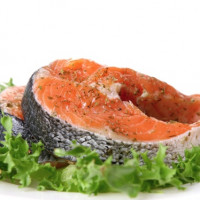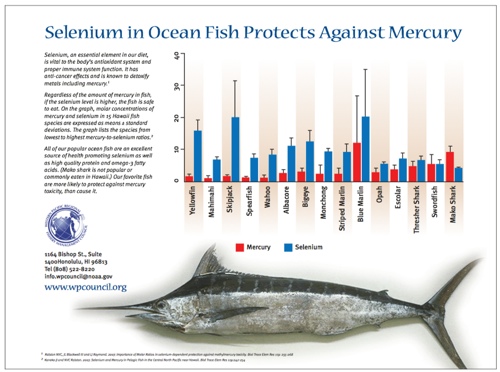
Over the last decade we’ve been told it’s no longer safe to eat fish because of the high levels of mercury they contain. These toxins, we’re told, can cause neurological problems and increase the risk of cancer. Pregnant women have been especially warned due to the potentially harmful effect these toxins could have on the developing fetus.
But when we examine the scientific evidence, a different story emerges.
While it’s true that the levels of mercury in fish are potentially harmful, that’s only true if the fish doesn’t have adequate levels of another mineral, selenium.
Selenium has a high binding affinity for mercury. When they’re found together in nature, they connect, forming an entirely new substance. This new substance is poorly absorbed by humans.
This explains why studies show that selenium protects against the adverse effects of mercury toxicity.
To use an analogy, think of selenium as if it were your income, and mercury as if it were a bill you have to pay. Just as we all need a certain amount of money to cover our living expenses, we all need a certain amount of selenium for proper function.
And guess what foods are the highest in selenium? 16 of the 25 best sources are, in fact, ocean fish!
There’s only one major study showing harmful effects caused by mercury consumed in seafood, and in that study the seafood consumed was pilot whale meat. Pilot whale meat is unusual in that it contains more mercury than selenium. As researcher Dr. Nick Ralson explains:
When you eat pilot whale meat it’s like getting a bill for $400 and a check for less than $100. If that happens too much, you go bankrupt. On the other hand, if you eat ocean fish, it’s like getting a check in the mail for $500 and getting a bill for $25. The more that happens, the happier you are.
The good news is that most ocean and freshwater fish have more selenium than mercury. The exceptions, as the chart below illustrates, are pilot whale, marlin, swordfish, tarpon and certain species of shark.
So, as long as pregnant women avoid eating the species of fish listed above that contain more mercury than selenium, they (and their babies) will be protected against the harmful effects of mercury toxicity.
But why should a woman consume fish in the first place? Seafood contain a long-chain omega-3 fatty acid called DHA. As a matter of fact, DHA is exclusively found in seafood – you can’t get it anywhere else in the diet. DHA is the most important of the omega-3 fatty acids, and is primarily responsible for the benefit we get from consuming them.
DHA is preferentially incorporated into the rapidly developing brain during pregnancy and the first two years of infancy, concentrating in the grey matter and they eyes. It’s also crucial to the formation of neurons, which are the functional cells in the brain, and to protecting the brain from oxidative damage.
There’s a large body of evidence supporting the importance of DHA during pregnancy. In one meta-analysis of 14 different studies, DHA improved visual acuity in kids in a dose-dependent manner (i.e. the more DHA they consumed, the better their vision). And countless observational studies show positive associations between maternal DHA levels during pregnancy and behavioral-attention scores, visual recognition, memory and language comprehension in infancy.
An FDA report in 2008 found that the nutrients in fish, including DHA, can boost a child’s IQ score by 10 points! This same report suggested that pregnant women eat at least 12 ounces of fish per week.
Unfortunately, Americans on average consume only 5 ounces of fish per week, and up to 14 percent of women of childbearing age consume no fish at all – despite the fact that DHA is essential to proper brain development.

Leave A Reply (No comments So Far)
No comments yet